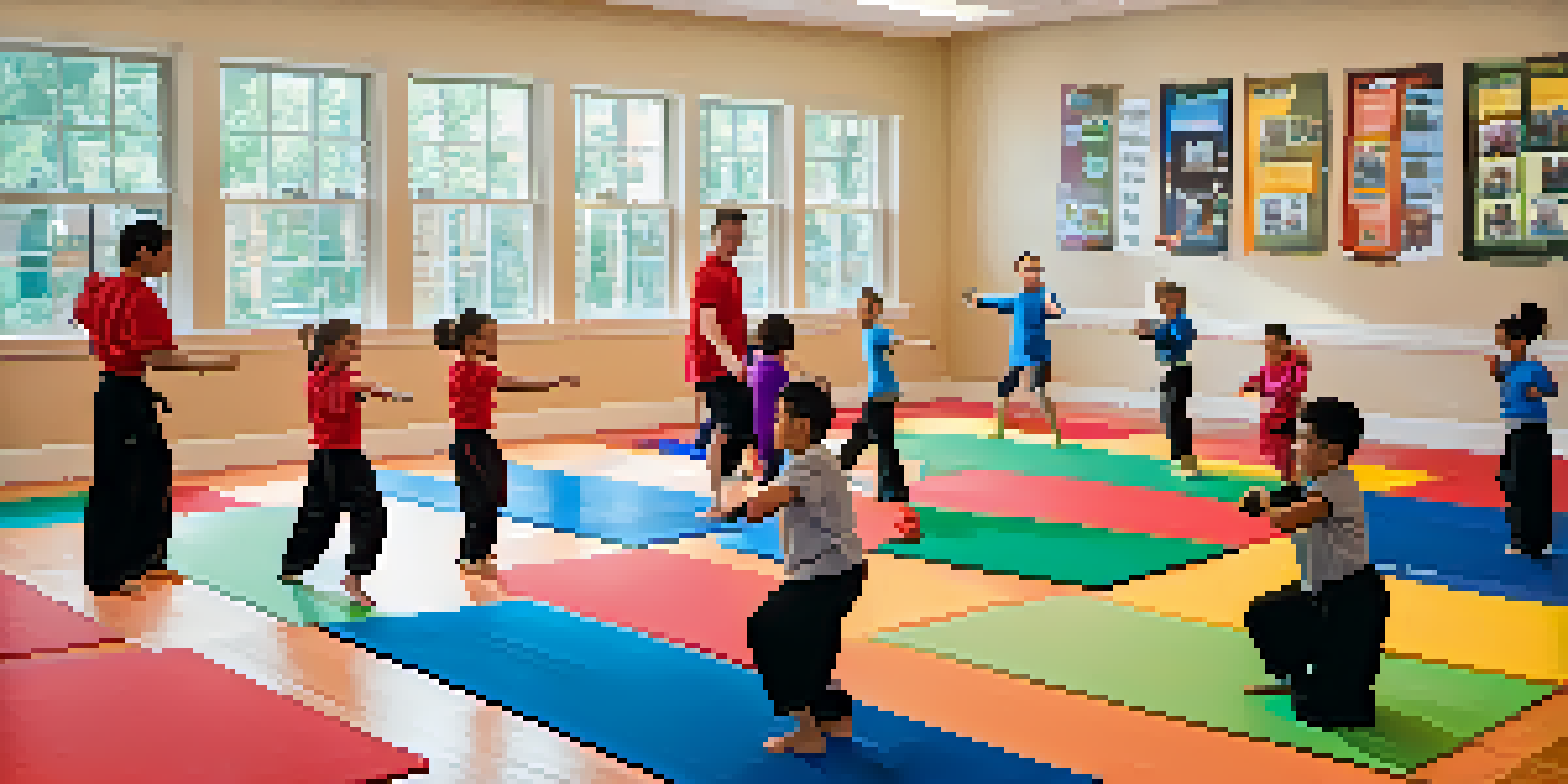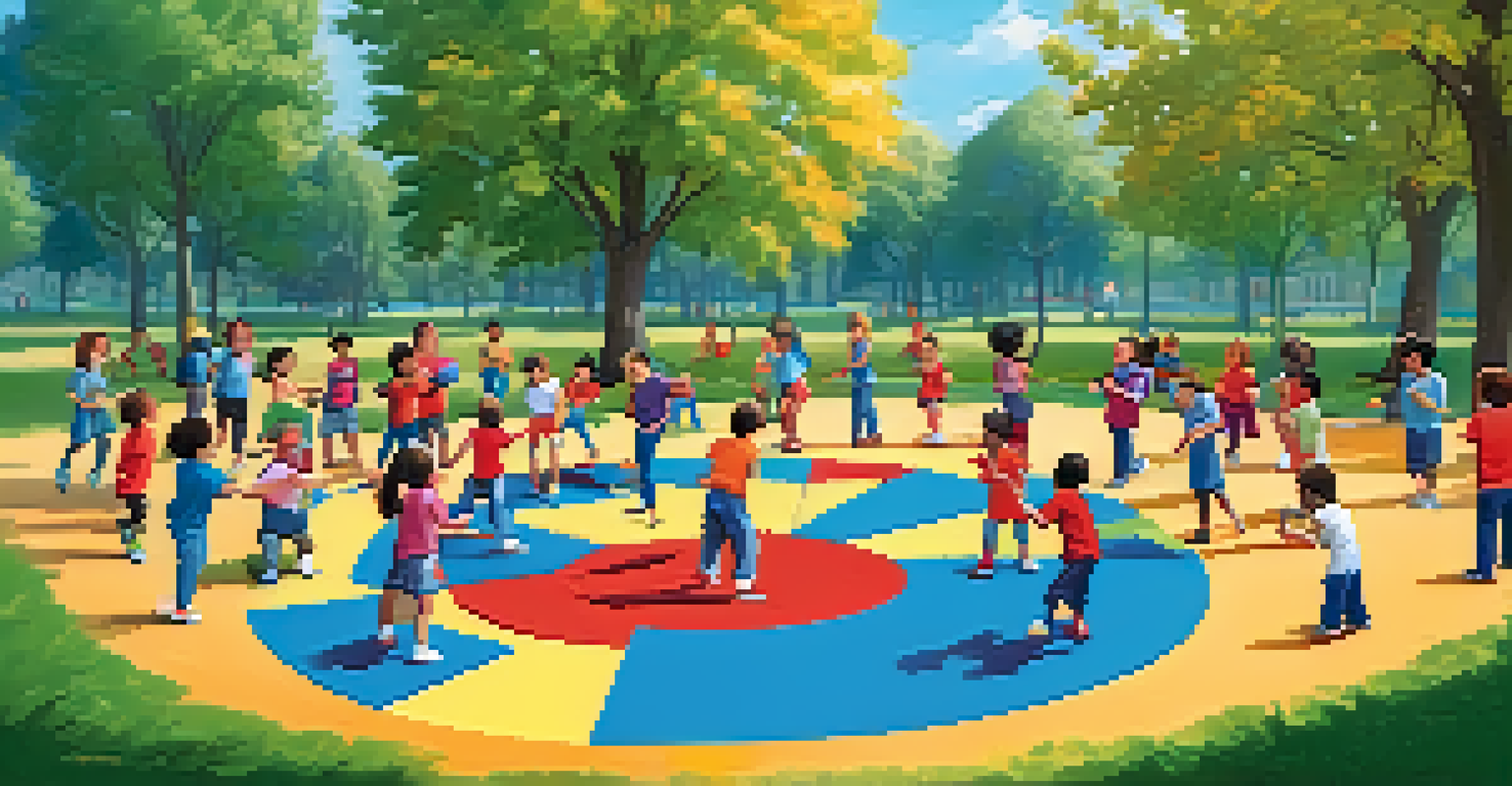Involving Kids in Self Defense: Fun and Safety Combined

Why Self-Defense is Important for Kids
Teaching kids self-defense equips them with vital skills for personal safety. It’s not just about fighting; it’s about confidence and awareness. Children learn to recognize potentially dangerous situations and how to respond effectively.
Self-defense is not just a skill; it's a life skill that builds confidence and resilience in children.
Involving kids in self-defense training can significantly reduce their fear of confrontational situations. When they are educated about their options, they feel empowered rather than helpless. This sense of empowerment can extend beyond physical safety to other areas of their lives.
Moreover, self-defense can foster resilience. Kids learn that it's okay to face challenges and that they can overcome them, which builds their mental strength and adaptability.
Choosing the Right Self-Defense Class
Finding the right self-defense class for your child is crucial for their engagement and safety. Look for programs tailored specifically for kids that emphasize fun while teaching practical skills. Many classes incorporate games and activities to keep children interested.

It's also important to check the credentials of the instructors. Qualified instructors should prioritize safety and have experience working with children. Engaging, enthusiastic teachers can make the learning process enjoyable, creating a positive environment.
Empower Kids Through Self-Defense
Teaching self-defense helps children gain confidence and awareness, empowering them to handle confrontational situations.
Consider the class size as well. Smaller groups allow for more personalized attention, which can enhance learning and ensure that every child feels supported. A comfortable environment encourages kids to ask questions and practice their skills without fear.
Making Self-Defense Fun and Engaging
Self-defense doesn’t have to be serious all the time—incorporating fun into lessons can keep kids engaged. Using games that involve movement, teamwork, and strategy can help reinforce techniques while keeping the atmosphere light. Think of it like learning through play!
The best defense is a good awareness of your surroundings and understanding your own abilities.
Role-playing scenarios can also be a great way to teach kids how to react in real-life situations. For instance, practice how to respond if approached by a stranger in a safe and controlled setting. This not only builds skills but also sparks their imagination.
Encouraging friendly competitions or challenges can motivate kids to practice more. Whether it's mastering a move or working together in pairs, these elements can create a supportive community where everyone feels involved and excited to learn.
Building Confidence and Self-Esteem
Engaging in self-defense training can significantly boost a child's confidence. As they learn and master new techniques, they begin to trust their abilities. This newfound confidence often spills over into other areas of their lives, such as academics or sports.
Self-defense teaches kids to set and achieve goals, whether that’s mastering a specific technique or preparing for a belt test. Celebrating these milestones helps reinforce their sense of accomplishment and encourages them to keep pushing their limits.
Choose Engaging Classes for Kids
Selecting fun and interactive self-defense classes fosters engagement and ensures kids learn effectively while feeling safe.
Additionally, the supportive environment of self-defense classes fosters friendships. Kids learn to support each other, which builds a strong sense of community and belonging, further enhancing their self-esteem.
Promoting Awareness and Prevention Skills
Self-defense training isn't just about physical techniques; it also emphasizes awareness and prevention. Kids learn to observe their surroundings and trust their instincts, which can be key in avoiding dangerous situations altogether. This heightened awareness is a skill that benefits them in countless scenarios.
Teaching children to identify potential threats helps them develop critical thinking skills. They learn to assess situations and make informed decisions, which can be incredibly empowering. It’s about equipping them with tools to navigate their world safely.
Moreover, discussions about safety and boundaries can be integrated into training. These conversations help kids understand the importance of consent and personal space, laying the groundwork for healthy interactions in the future.
Incorporating Self-Defense at Home
Parents can play a vital role in reinforcing self-defense skills at home. Simple conversations about safety, role-playing scenarios, or practicing techniques together can make a huge difference. This not only strengthens the skills they learn in class but also promotes family bonding.
Creating a safe space for dialogue about fears and concerns encourages kids to express themselves. Ask them what they learned in class and how they feel about it. This open line of communication can help reassure them and reinforce their training.
Build Confidence and Community
Self-defense training not only boosts children's self-esteem but also creates a supportive environment that fosters friendships.
Additionally, consider setting up a regular practice schedule. Just like with any skill, consistency is key. Regular practice at home can help solidify their learning and keep their skills sharp.
The Long-Term Benefits of Self-Defense Training
The benefits of self-defense extend far beyond the classroom. As kids grow, the skills they learn can support their overall development. Whether it's confidence, resilience, or social skills, these lessons can last a lifetime.
Moreover, self-defense training can inspire a lifelong appreciation for physical fitness. Kids who engage in these activities may develop healthier habits as they learn the importance of staying active and protecting their well-being.

Finally, the sense of community built in self-defense classes can lead to lasting friendships. These connections can provide kids with a support network, helping them navigate challenges both in and out of the dojo.